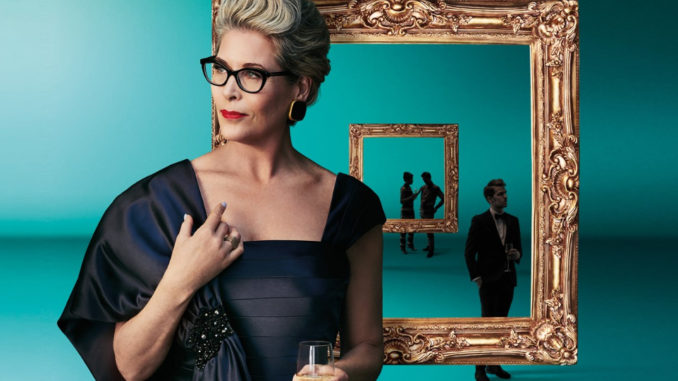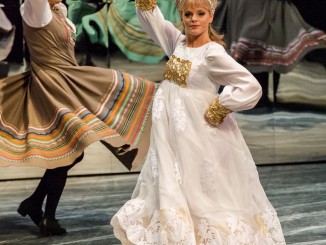
[Where are the Women at the Waterfront?]
During the uproar over the Pop-up Globe’s decision to use an all-male cast while invoking #MeToo in their promotion, Auckland Theatre Company did a Facebook post “Celebrating the amazing women of our 2017-2018 season!” ATC name checked their lead actors – “phenomenal matriarchs of the stage” – Jennifer Ward-Lealand, Alison Bruce and Jennifer Ludlam. The post finished with the promise, “we look forward to bringing you more strong female characters in upcoming seasons!”
The imagery for ATC’s newly announced 2018-2019 season promises some particularly juicy female roles: there’s Theresa Healey sucking lemons as her Majesty QEII in Peter Morgan’s The Audience, mother-daughter duo Kate McGill and Ginette McDonald in Tom Scott’s Joan, the ever poised Jennifer Ward-Lealand is back again in John Guare’s Six Degrees of Separation, and Rashmi Pilapitiya and Kalyani Nagarajan are watched over by a portrait of Indira Gandhi in Sudha Bhuchar and Kristine Landan-Smith’s stage adaptation of Rohninton Mistry’s novel A Fine Balance.
But is it enough to have strong female characters™ when this is not matched with strong female artistic voices guiding the representations in writing or direction? You may have noticed that of the listed works, only A Fine Balance (which debuted in London in 2006) involves female writers. Indeed, every other play programmed in ATC’s upcoming season are written by men. And the new season also has a director problem. Dramaturg and commentator Kate Prior has crunched the numbers:
New season theatre stats time!
ATC’s 2019 season:
3 out of 7 plays new NZ workOf the 3 NZ playwrights:
2 Pākehā / 1 Māori
3 men / 0 womenOf the 7 directors:
5 Pākehā / 1 Māori / 1 Sri Lankan
7 men / 0 womenZ E R O N Z W O M E N
— Kate Prior (@kateprior) October 25, 2018
(Kate clarifies that the New Zealand work isn’t strictly ‘new’. Note too that these statistics don’t include the Shortland Street Musical, which premieres this year but officially marks the start of ATC’s new season. This adds another Pākehā male writer and another Pākehā male director to the tally.)
There have long been grumbles about the shockingly few female playwrights programmed by ATC over the years. But this year – when gender continues to be major front-line in local and global culture shifts and skirmishes – the numbers are especially stark.
It is not good enough.
It is a resignation of leadership by Auckland’s major funded theatre company.
The industry have been talking loudly in person and on social media over the past few days, and they are fed up.
ATC’s 2017-2018 main bill season had one play from a female writer (Under the Mountain, an adaptation of Maurice Gee’s book by Pip Hall). There were three female directors – Katie Wolfe (Rendered), Sara Brodie (Under the Mountain) and Eleanor Bishop (Mrs Warren’s Profession) – and two male directors: Artistic Director Colin McColl (Filthy Business and The Cherry Orchard) and Benjamin Henson (Red Speedo).
This was encouraging, but now looks like a blip. Next year’s programme is one step forward, two steps back.
In good news, ATC are partnering with Te Rēhia Theatre Company to present Astroman by Albert Belz with direction by Tainui Tukiwaho, and Prayas Theatre to remount their production of A Fine Balance with direction by Ahi Karunaharan (Prayas’ TAPAC production of the play was a highlight of 2015). Co-producing work led by Māori and South Asian creatives is a welcome move for ATC, harnessing ATC’s resources to amplify the excellent work of both of these companies, but neither shows have been programmed in ATC’s home ASB Waterfront Theatre. While Astroman is currently playing a substantial season for Melbourne Theatre Company and on Christchurch’s Court Theatre’s mainstage, ATC’s Astroman, along with A Fine Balance, will play at Q Theatre. ATC say the idea is for the companies to upskill in order to take on the challenges of working in a bigger theatre in the future.
But what’s programmed in the flagship Waterfront Theatre in the meantime? ATC have local works Shortland Street – the Musical and a double bill of Tom Scott plays The Daylight Atheist and Joan (a ‘Ma and Da’ season with the plays inspired by Scott’s parents – the Joan production is an import of Circa Theatre’s production). The programming of international plays features The Audience, Six Degrees of Separation and Tom Stoppard’s Rosencrantz and Guildenstern Are Dead. Premiering respectively in 2013, 1990 and 1996, these three plays are prestige canonical western dramas. The Helen Mirren production of The Audience screened in cinemas here for NT Live, Six Degrees of Separation is a quintessential American character drama that saw a limited run Broadway revival in 2017, and Stoppard’s famous play has previously been produced by ATC in 2001 (a production I was obsessed with as a 12-year-old!). None of these international plays are obviously calling out to be produced in Auckland in 2019, but ATC know that they are likely to sell well. ATC are playing it very safe with these choices.
ATC are open that their programming next year is partly a response to a subscriber-led rebellion against this year’s plays. In the comments of ATC’s Facebook post celebrating the “amazing women” featured during the 2017-2018 season, audience members have written “shame about the plays” and “pity the “modernised” scripts were so dreadful.”
After receiving complaints, ATC wrote to their subscriber base in July, acknowledging that adaptations of Mrs Warren’s Profession and The Cherry Orchard “didn’t resonate with everyone.”
(While Mrs Warren’s Profession – a fascinating but ultimately unsuccessful George Bernard Shaw intervention – was genuinely boundary pushing, Cherry Orchard was the kind of pretty standard NZ relocation of a classical text that we’ve been doing forever.)
ATC have attempted to reassure their loyal subscribers by programming “bold, award-winning and big-hearted” plays for the next season (see this NZ Herald preview by Dionne Christian for more information).
ATC’s Waterfront Theatre is only just two years old, and ATC are still experimenting with and learning about what works in the space, and what audiences want to see in there. This doesn’t always overlap.
To their significant credit, ATC has also been experimenting offstage with how the company can support the development of theatre artists and the industry.
ATC’s Artistic Director Colin McColl has stepped back a little over the past few years in terms of his stage directing, mentoring others directors to step up into the main bill. Both Benjamin Henson and Ahi Karunaharan, who feature in the 2018-2019 programme, participated in an ‘Engine Room’ directors programme with ATC.
In 2017 ATC appointed Katie Wolfe, Kate Parker and Malia Johnston as the company’s first-ever ‘associate’ artists. At the end of that year their work-in-development was featured in a “festival-style weekend” under the title The Navigators (Villainesse posted an article about the season with the title ‘What happens when women take over the theatre?’).
McColl was encouragingly quoted: “We believe it’s time for some fresh thinking, for provocations and for people to challenge our accepted way of doing things. We are excited to be working with these three extraordinary wahine toa who bring diverse perspectives to the table and stimulate our ideas on performance in order to build the artistic capacity of the company.”
While Wolfe directed Rendered superbly this year, it is disappointing that none of these Navigators works have been featured in the upcoming season. Perhaps there is still potential for 2019-2020?
‘Diverse’ and ‘diversity’ are loaded terms. A company cannot claim to be diverse when underrepresented groups are pitted against each other. While we can celebrate the spotlight being
given to Te Rēhia and Prayas, it also makes the spotlight next to them, illuminating the bare stage where the women writers and directors should be, glare even brighter.
Nor can ATC point to having three main bill female directors in this most recent season and declare mission accomplished. There can be no resting on laurels: you are only as good as your current season.
Whose Stories?
The basic unit of theatre is empathy – the sensitive writer moves in and out of all the characters in their script, taking on different ideologies, experiences, and yes, gender identities, irrespective of their own. A good director follows the writer in living and breathing the full world of the play and the characters. Of course, each individual writer or director has their own sensibilities and (sometimes huge) blind spots.
Gender-diversity needs to be one of the lenses through which a theatre programme is examined by an Artistic Director and their Board. I shouldn’t need to write that, but in ATC’s case it seems to have been either overlooked, ignored as something of low importance, or was a conversation that only got as far as the acting roles. What’s new?
But if audiences are only primarily being offered work by male playwrights, directed by male directors, then audiences are only getting a limited palette of all the creative possibilities.
In Mother of All Questions, Rebecca Solnit, in the context of the silencing of women’s voices, explores the ways stories shape how a society understands itself. She writes that “Liberation is always in part a storytelling process: breaking stories, breaking silences, making new stories. A free person tells her own story. A valued person lives in a society in which her story has a place.”
What does ATC’s 2018-2019 Waterfront Theatre season tell us about whose stories are valued on the big stage?
We know this one. ‘Safe’ commercial programming equals white and male.
And I say this as a Pākehā male: how boring. I go to theatre to live other lives, to escape the tyranny of my own viewpoint.
Where to Now?
There are formidable female artists at all levels of ATC – not just playing the leading roles, but in the literary unit, costuming, lighting, stage management and more. ATC’s Here & Now Youth shows, led by Associate Director Lynne Cardy, lead the way in inclusivity and theatrical boldness (for example Boys, directed by Eleanor Bishop and Julia Croft, was in my opinion the most exciting show produced by ATC in 2017).
But the mainstage main bills need consistent gender diversity in playwriting and directing.
Perhaps one immediate step ATC can take is to commit to employing female and gender-diverse assistant directors over the upcoming season, who can move up through the company. This is about access to opportunity, about who gets a foot in the door. There is no shortage of talent and ability.
Or, like the Pop-up Globe, ATC could go back to the drawing board, and re-examine their programme.
This should be part of an ongoing intersectional effort around representation and continual interrogation of what it means to be the leading theatre company of Tāmaki Makaurau. (There are of course wider issues about who gets access to ATC ticket prices, although initiatives like ATC’s Education programme helps.)
We need an accountable commitment by ATC to do better. Artists need to lead from the front – to help us imagine and then become the kind of society we aspire to be.
I acknowledge the challenge for a company like Auckland Theatre Company is always about balancing programming popular commercial work with productions that push a little more at the edges. Part of ATC’s duty towards everyone that it employs is ensuring the company stays financially sustainable. They need to take audiences with them. In their letter to subscribers, ATC wrote: “We need to satisfy a wide range of tastes and we also need to ensure shows reflect not only the vast theatre canon but the world we live in right now.” Unfortunately, ATC’s canon looks very narrow indeed next year.
And in retreating to this conservative programme for 2018-2019, the implicit message is that women playwrights and directors aren’t commercial. And that is absurd.
What do ATC subscribers think about that?
What about major funders Creative New Zealand? Auckland Council?
What signal is this sending to the industry and audience about whose work has value?
ATC have huge power and responsibility in what stories they share on their stage. As Solnit puts it, “by redefining whose voice is valued, we redefine our society and its values.”
The upcoming Waterfront season of plays offers ATC’s subscribers and general audiences a tired time-capsule world. Open the doors, let our actual world in.
UPDATE: Auckland Theatre Company’s Chief Executive Lester McGrath has sent the following response:
Getting the balance of a mainstage programme right every year is a tricky thing. We need to satisfy a wide range of tastes and we also need to ensure shows reflect the vast theatre canon as well as the world we live in right now. In our current season we have five new works by women plus one adaptation as well as six works directed by women.
In the 2018/19 season we have four New Zealand works in our season (including Shortland Street – The Musical) which is 50% of the subscription programme. We are proud to be supporting these local works. A FINE BALANCE, the play, is written by two women. We already have 17 women cast in our shows for our 2019 season as well as numerous more female creatives and cast still to be contracted and cast. Our season embraces our diverse New Zealand cultures and stories and our casting and new collaborations reflect that.
The artistic team are always open to ideas which would deliver a sustainable subscription season in the 670-seat ASB Waterfront Theatre. We are currently developing work of scale for the mainstage with a number of female playwrights/ theatre-makers.
ATC also promotes and supports exciting new theatre-makers of all genders by providing free rehearsal space, internships, feedback on scripts and through our HERE AND NOW and Creative Learning programmes. These are highly praised throughout the education sector and beyond in terms of their work with diverse new audiences and emerging artists across the city.
Theatre making is a highly collaborative business. The company works with a significant number of women to make theatre, including a good number in leadership, artistic and decision making positions.
It is encouraging to hear that there is more development work in the pipeline, but that’s at least another entire year for Aucklanders to wait. McGrath discusses the programme as a whole here, but it is worth repeating how disappointing it is that in the 2018-2019 main bill season there will be no work directed by women, and all of ATC’s main bill plays programmed at the Waterfront Theatre will be written by white men.
Does Creative New Zealand, the Government’s arts funding body, need to establish gender diversity as a core KPI for their funded companies (ATC is funded as a main centre theatre under their Toi Tōtara Haemata Investment Programme), to ensure that a situation like this never happens again?
While I respect that Auckland Theatre Company’s production mix will never satisfy all tastes, gender and cultural diversity should be a consistent and uncontroversial bottom line of theatre programming.
Post-Script: Here I leave some names of New Zealand theatre directors whose work I’ve seen and enjoyed. Some have a substantial body of work, others have directed only once or twice. I’m always keen to see more from all of them. You might have your own list too.
Jennifer Ward-Lealand, Anapela Polataivao, Silo’s Sophie Roberts, Kate Parker, Alison Quigan, Jackie Van Beek, Michelle Johansson, Katie Wolfe, Red Leap’s Julie Nolan, Malia Johnston, Sara Brodie, Alice Canton, Kate McGill, Chye-Ling Huang, Julia Croft, Eleanor Bishop, Nisha Madhan, Jane Yonge, Rachael Longshaw-Park, Hweiling Ow, Saraid Cameron, Miriama McDowell, Rita Stone Berridge, Torum Heng, Katy Maudlin, Laurel Devenie, Georgina Silk, Abigail Greenwood, Dawn Glover, Amber Liberté, Renee Liang, Irene Corbet, Amanda Leo, Cherie Moore, Jo Randerson, Stella Reid, Alexandra Grice, Katie Burson, Cian Elyse White, Virginia Frankovich, Isabelle McKinnon, Romy Hooper, Holly Chappell, Freya Finch, Anya Tate-Manning, Amber Curreen, Geraldine Brophy, Massive’s Sam Scott, Jessica Joy Wood, Nancy Brunning, Sananda Chatterjee, The Conch’s Nina Nawalowalo, Jess Holly Bates, Grace Taylor, Renee Lyons, Rachel House.
And more endorsements keep rolling in: Lara Mcgregor, Mel Luckman, Lori Leigh, Abby Howells, Hannah Smith, Anya Tate-Manning, Katherine McRae, Lizzie Tollemache, Rose Kirkup, Kerryn Palmer, Lyndee Jane Rutherford, Miria George, Cassandra Tse, Adam Rohe, Cathy Downes, Yvonne Martin, Akashi Fisi’inaua.




Do you ever think ATC would feature a *trans director or writer or actor? This is all very cis het except for Ben Henson, i love the way he plays with gender. They do have a gay character in Six Degrees of seperation but will they be played by a gay performer? It’s really great to see Adam David Rohe making strides into the industry, but will ATC and theatre comentators catch up with the world of non binary gender?
Thank you, Adam is another great developing director!